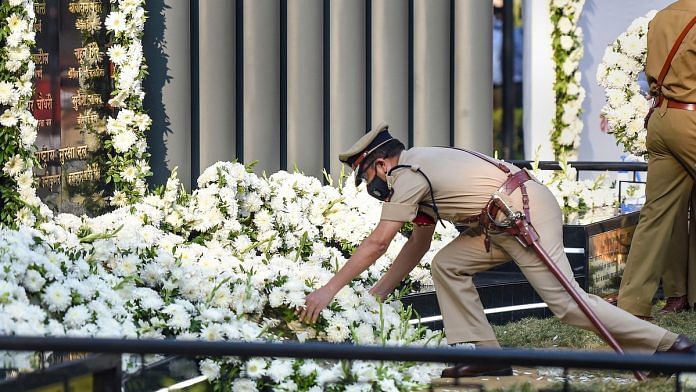
Mumbai: As many as 113 personnel with the Mumbai Police have died of heart attacks in the past 3.5 years, while many are working under significant levels of stress, staff shortage and struggling with basic needs such as housing, a survey conducted by Mumbai-based NGO Praja Foundation has found.
It also showed that 16 more personnel committed suicide between April 2017 and October 2020.
The report was released Thursday, on the 12th anniversary of the 26/11 Mumbai terror attack that killed 170 people, including 18 security personnel.
“Mumbai Police has been in the forefront of maintaining law and order during the pandemic and the ensuing lockdown…While the Mumbai Police have performed many more functions during the pandemic, it has been working under severe pressure, and has been overburdened well before the pandemic,” Nitai Mehta, managing trustee of the Praja Foundation, said.
But S. Chaitanya, deputy commissioner of police (DCP) (operations) and spokesperson of the Mumbai Police, said, “The Mumbai Police has been implementing eight-hour work shifts to address issues of stress and lifestyle disorders. This was disrupted due to the Covid-19 pandemic when we were short of police personnel. But the rule is very much there.”
He also said, “Our commissioner of police and all other officers are very particular about fitness and keep emphasising its importance to the entire police force whenever an opportunity presents. We have also started gyms in police stations.”
Shortage of staff, housing issues
The Praja report highlighted numerous vacancies across police departments in Mumbai. The police department has been struggling with an 18 per cent staff crunch, the report said, with the situation being most dire in the police sub-inspector and assistant police sub-inspector categories, which are reeling under a shortage of 35 and 37 per cent, respectively.
Mumbai’s forensic laboratories have also been struggling with a 42 per cent staff shortage, while there was a 28 per cent and 14 per cent staff shortage respectively among sessions court prosecutors and sessions court judges, impacting the speed of justice delivery.
According to DCP Chaitanya, staff shortage was an issue that has to be addressed at the level of the state government.
Mehta, however, said, “We all are aware of the high Covid-19 incidence and deaths in the Mumbai Police. But over the years, a large number of police persons have succumbed to lifestyle-related diseases directly linked to exposure in work and working conditions.”
According to the report, 90 Mumbai Police personnel have died due to Covid-19 as of October.
It also noted that there was a shortage of 31,620 police housing units in Mumbai, translating into 62 per cent of Mumbai Police personnel not having accommodation.
Chaitanya said housing was a priority for the force and constant attempts were being made to create more accommodation and provide better quality living for the personnel.
“There is an electronic system where houses are allocated through a software for fair allocation of houses. There is no arbitrariness in who gets a house,” he added.
Mehta added, “In terms of living conditions as well, we have been unable to provide adequate housing for the police force…Shortage of police personnel and quality of working/living conditions of police in turn affects the overall performance, such as in the investigation of cases.”
At the end of 2019, the report noted, 64 per cent of crimes registered under the Indian Penal Code (IPC) were pending for investigation. In the trial courts, at the end of 2019, 2,49,922 cases were to be tried under IPC in Mumbai, of which judgment was given in just 6 per cent of cases.
The highest pendency of cases for investigation were crimes committed against women and children. By 2019 end, the report noted, 73 per cent cases that were pending were crimes against children and 67 per cent were crimes against women.
Most rape cases in Mumbai against children
The Praja report also noted that there has been a 24 per cent growth in the number of rape cases in Mumbai — from 728 in 2016-16 to 904 in 2019-20. Moreover, 61 per cent of the total rape cases in Mumbai last year were registered under the Protection of Children from Sexual Offences (POCSO) Act.
While the POCSO Act calls for all cases registered under it to be tried by a special court, 226, or a little over 50 per cent of the cases that went to trial under the legislation in 2019 were tried at a regular trial court.
The POCSO Act also mandates that courts should complete trials within a year of the cognisable offence. However, of the 222 cases that were tried in a POCSO court in 2019, only 20 per cent resulted in a conviction of acquittal within a year, the Praja report has found.
Subscribe to our channels on YouTube & Telegram
Why news media is in crisis & How you can fix it
India needs free, fair, non-hyphenated and questioning journalism even more as it faces multiple crises.
But the news media is in a crisis of its own. There have been brutal layoffs and pay-cuts. The best of journalism is shrinking, yielding to crude prime-time spectacle.
ThePrint has the finest young reporters, columnists and editors working for it. Sustaining journalism of this quality needs smart and thinking people like you to pay for it. Whether you live in India or overseas, you can do it here.